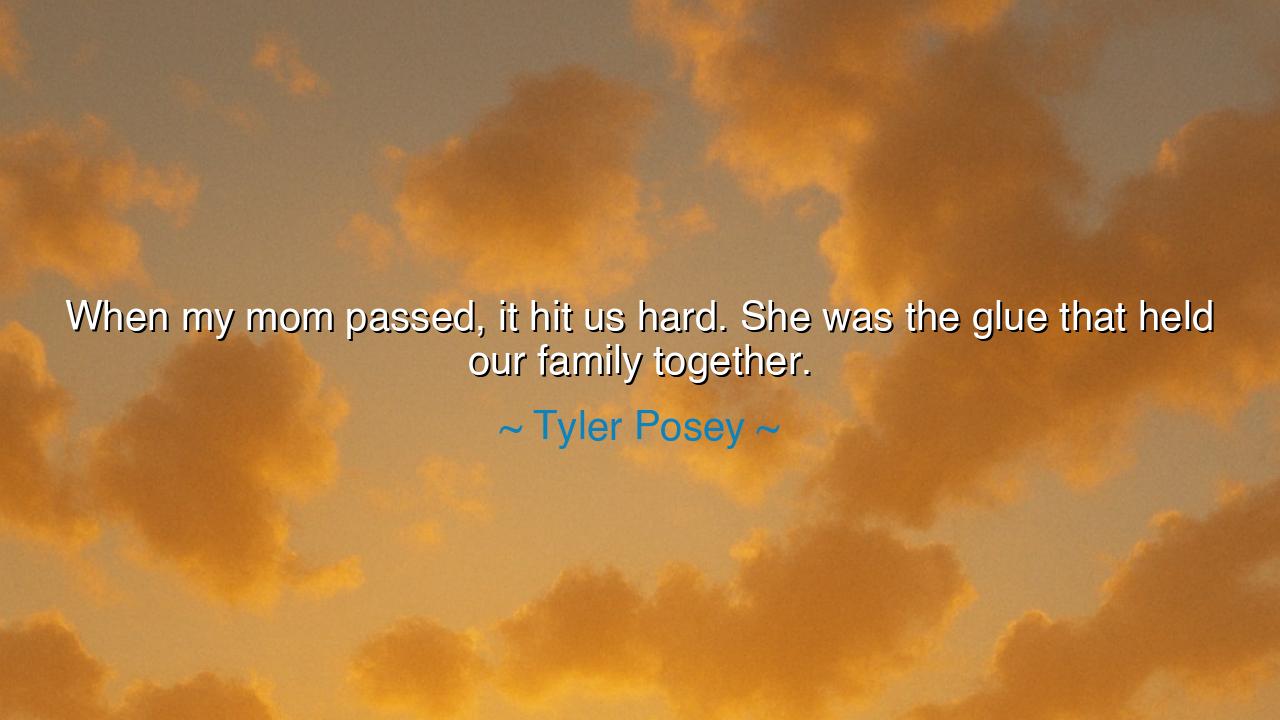
When my mom passed, it hit us hard. She was the glue that held






The words of Tyler Posey, “When my mom passed, it hit us hard. She was the glue that held our family together,” strike a universal chord that echoes through every age of humanity. Within this simple yet powerful reflection lies the eternal truth of maternal love—that invisible force which binds hearts, mends divisions, and sustains the fragile structure of family. A mother is not merely a presence in the home; she is its pulse, its warmth, its hidden architecture. When she departs, it is as if the sun itself has dimmed, and those who once revolved around her are left searching for direction in the dusk.
In ancient times, poets and philosophers spoke often of the sacred feminine, the principle of unity and nurture. The Greeks called it Eros—the binding love that holds not only families but the entire cosmos together. In every hearth, that power is embodied by the mother. She is the silent weaver who threads love into the fabric of daily life—through meals cooked with care, through words that soothe wounds unseen, through her presence that keeps chaos at bay. When such a soul departs, the tapestry begins to fray. Posey’s words reveal the ache of that unraveling, when the family, once firm and interwoven, finds itself fragmented by loss.
There is a story from the days of Rome of a matron named Cornelia, the mother of the Gracchi brothers. When asked to display her jewels, she brought forth her sons and said, “These are my treasures.” She raised them in virtue, justice, and compassion, shaping not only their lives but the destiny of the Republic itself. When she passed, her sons were left with her teachings as the only glue that could still hold them upright amid political storms. Yet even they confessed that the world seemed colder, the home emptier, for the heart of their house had gone. Such is the eternal pattern: the mother’s strength may endure through her children, but her absence leaves an ache no power or glory can mend.
Tyler Posey’s quote captures the quiet catastrophe that follows such a loss. The family, once orbiting around the mother’s gravity, often drifts apart like planets losing their sun. Arguments that once dissolved in her calm voice now linger. Meals once shared turn into solitude. The smallest rituals—a call, a laugh, a scent in the hallway—become sacred ghosts. Yet within that sadness lies a hidden invitation: to learn what she once embodied, to carry her strength into the future, to become the new bond that restores connection. For grief, when honored properly, does not destroy; it refines.
In the East, there is a teaching that when the lotus withers, its seeds fall into the mud to bloom anew. The passing of a mother can be such a transformation. The love she gave becomes the seed of resilience within her children. Though she is no longer there to hold them together, her memory becomes a silent teacher, urging them to hold one another. This is how the circle of care continues—through remembrance, through the decision to live as she once did, through the rekindling of her spirit in new acts of love.
The great writer Victor Hugo, after losing his beloved daughter Léopoldine, wrote that grief is a storm that purifies the sky of the soul. In those words we glimpse the same truth Posey touched upon: the devastation of loss reveals what truly matters. We discover that it was not the things, nor the wealth, nor even the laughter that held us together—it was the love of one who asked for nothing and gave everything. That realization is both heartbreaking and divine. It awakens us to gratitude, and to the duty of carrying on her light.
The lesson is clear and sacred: never take for granted the one who holds your world together. Honor her while she lives. Learn from her patience, her forgiveness, her strength. And when she is gone, do not let her absence dissolve what she built. Instead, become what she was. Be the glue. Be the warmth. Be the center that keeps love alive. In doing so, you do not replace her—you continue her. For though a mother may pass from this world, her true legacy is not her name or face, but the love she planted in the hearts of those who remain. And that, if tended well, will hold the family—and the spirit of humanity itself—together for generations to come.






AAdministratorAdministrator
Welcome, honored guests. Please leave a comment, we will respond soon